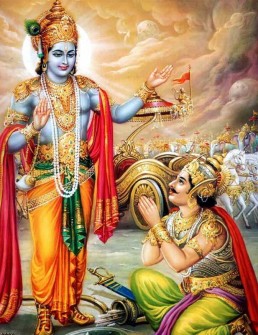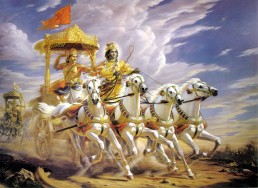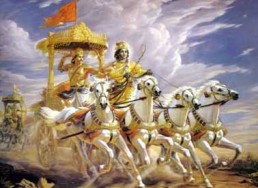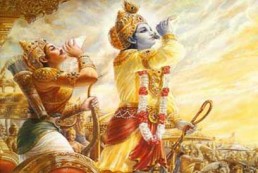Bhagavad Gita-Chapter 10 All Verses with Meaning and Audio
भूय एव महाबाहो शृणु मे परमं वचः ।
यत्तेऽहं प्रीयमाणाय वक्ष्यामि हितकाम्यया ॥ १०-१॥
bhūya eva mahābāho śṛṇu me paramaṃ vacaḥ
yatte’haṃ prīyamāṇāya vakṣyāmi hitakāmyayā 10-1
अहमादिर्हि देवानां महर्षीणां च सर्वशः ॥ १०-२॥
ahamādirhi devānāṃ maharṣīṇāṃ ca sarvaśaḥ 10-2
असम्मूढः स मर्त्येषु सर्वपापैः प्रमुच्यते ॥ १०-३॥
asammūḍhaḥ sa martyeṣu sarvapāpaiḥ pramucyate 10-3
सुखं दुःखं भवोऽभावो भयं चाभयमेव च ॥ १०-४॥
sukhaṃ duḥkhaṃ bhavo’bhāvo bhayaṃ cābhayameva ca 10-4
भवन्ति भावा भूतानां मत्त एव पृथग्विधाः ॥ १०-५॥
bhavanti bhāvā bhūtānāṃ matta eva pṛthagvidhāḥ 10-5
मद्भावा मानसा जाता येषां लोक इमाः प्रजाः ॥ १०-६॥
madbhāvā mānasā jātā yeṣāṃ loka imāḥ prajāḥ 10-6
सोऽविकम्पेन योगेन युज्यते नात्र संशयः ॥ १०-७॥
so’vikampena yogena yujyate nātra saṃśayaḥ 10-7
इति मत्वा भजन्ते मां बुधा भावसमन्विताः ॥ १०-८॥
iti matvā bhajante māṃ budhā bhāvasamanvitāḥ 10-8
कथयन्तश्च मां नित्यं तुष्यन्ति च रमन्ति च ॥ १०-९॥
kathayantaśca māṃ nityaṃ tuṣyanti ca ramanti ca 10-9
ददामि बुद्धियोगं तं येन मामुपयान्ति ते ॥ १०-१०॥
dadāmi buddhiyogaṃ taṃ yena māmupayānti te 10-10
नाशयाम्यात्मभावस्थो ज्ञानदीपेन भास्वता ॥ १०-११॥
nāśayāmyātmabhāvastho jñānadīpena bhāsvatā 10-11
परं ब्रह्म परं धाम पवित्रं परमं भवान् ।
पुरुषं शाश्वतं दिव्यमादिदेवमजं विभुम् ॥ १०-१२॥
paraṃ brahma paraṃ dhāma pavitraṃ paramaṃ bhavān
puruṣaṃ śāśvataṃ divyamādidevamajaṃ vibhum 10-12
असितो देवलो व्यासः स्वयं चैव ब्रवीषि मे ॥ १०-१३॥
asito devalo vyāsaḥ svayaṃ caiva bravīṣi me 10-13
न हि ते भगवन्व्यक्तिं विदुर्देवा न दानवाः ॥ १०-१४॥
na hi te bhagavanvyaktiṃ vidurdevā na dānavāḥ 10-14
भूतभावन भूतेश देवदेव जगत्पते ॥ १०-१५॥
bhūtabhāvana bhūteśa devadeva jagatpate 10-15
याभिर्विभूतिभिर्लोकानिमांस्त्वं व्याप्य तिष्ठसि ॥ १०-१६॥
yābhirvibhūtibhirlokānimāṃstvaṃ vyāpya tiṣṭhasi 10-16
केषु केषु च भावेषु चिन्त्योऽसि भगवन्मया ॥ १०-१७॥
keṣu keṣu ca bhāveṣu cintyo’si bhagavanmayā 10-17
भूयः कथय तृप्तिर्हि शृण्वतो नास्ति मेऽमृतम् ॥ १०-१८॥
bhūyaḥ kathaya tṛptirhi śṛṇvato nāsti me’mṛtam 10-18
हन्त ते कथयिष्यामि दिव्या ह्यात्मविभूतयः ।
प्राधान्यतः कुरुश्रेष्ठ नास्त्यन्तो विस्तरस्य मे ॥ १०-१९॥
hanta te kathayiṣyāmi divyā hyātmavibhūtayaḥ
prādhānyataḥ kuruśreṣṭha nāstyanto vistarasya me 10-19
अहमादिश्च मध्यं च भूतानामन्त एव च ॥ १०-२०॥
ahamādiśca madhyaṃ ca bhūtānāmanta eva ca 10-20
मरीचिर्मरुतामस्मि नक्षत्राणामहं शशी ॥ १०-२१॥
marīcirmarutāmasmi nakṣatrāṇāmahaṃ śaśī 10-21
इन्द्रियाणां मनश्चास्मि भूतानामस्मि चेतना ॥ १०-२२॥
indriyāṇāṃ manaścāsmi bhūtānāmasmi cetanā 10-22
वसूनां पावकश्चास्मि मेरुः शिखरिणामहम् ॥ १०-२३॥
vasūnāṃ pāvakaścāsmi meruḥ śikhariṇāmaham 10-23
सेनानीनामहं स्कन्दः सरसामस्मि सागरः ॥ १०-२४॥
senānīnāmahaṃ skandaḥ sarasāmasmi sāgaraḥ 10-24
यज्ञानां जपयज्ञोऽस्मि स्थावराणां हिमालयः ॥ १०-२५॥
yajñānāṃ japayajño’smi sthāvarāṇāṃ himālayaḥ 10-25
गन्धर्वाणां चित्ररथः सिद्धानां कपिलो मुनिः ॥ १०-२६॥
gandharvāṇāṃ citrarathaḥ siddhānāṃ kapilo muniḥ 10-26
ऐरावतं गजेन्द्राणां नराणां च नराधिपम् ॥ १०-२७॥
airāvataṃ gajendrāṇāṃ narāṇāṃ ca narādhipam 10-27
प्रजनश्चास्मि कन्दर्पः सर्पाणामस्मि वासुकिः ॥ १०-२८॥
prajanaścāsmi kandarpaḥ sarpāṇāmasmi vāsukiḥ 10-28
पितॄणामर्यमा चास्मि यमः संयमतामहम् ॥ १०-२९॥
pitṝṇāmaryamā cāsmi yamaḥ saṃyamatāmaham 10-29
मृगाणां च मृगेन्द्रोऽहं वैनतेयश्च पक्षिणाम् ॥ १०-३०॥
mṛgāṇāṃ ca mṛgendro’haṃ vainateyaśca pakṣiṇām 10-30
झषाणां मकरश्चास्मि स्रोतसामस्मि जाह्नवी ॥ १०-३१॥
jhaṣāṇāṃ makaraścāsmi srotasāmasmi jāhnavī 10-31
अध्यात्मविद्या विद्यानां वादः प्रवदतामहम् ॥ १०-३२॥
adhyātmavidyā vidyānāṃ vādaḥ pravadatāmaham 10-32
अहमेवाक्षयः कालो धाताहं विश्वतोमुखः ॥ १०-३३॥
ahamevākṣayaḥ kālo dhātāhaṃ viśvatomukhaḥ 10-33
कीर्तिः श्रीर्वाक्च नारीणां स्मृतिर्मेधा धृतिः क्षमा ॥ १०-३४॥
kīrtiḥ śrīrvākca nārīṇāṃ smṛtirmedhā dhṛtiḥ kṣamā 10-34
मासानां मार्गशीर्षोऽहमृतूनां कुसुमाकरः ॥ १०-३५॥
māsānāṃ mārgaśīrṣo’hamṛtūnāṃ kusumākaraḥ 10-35
जयोऽस्मि व्यवसायोऽस्मि सत्त्वं सत्त्ववतामहम् ॥ १०-३६॥
jayo’smi vyavasāyo’smi sattvaṃ sattvavatāmaham 10-36
मुनीनामप्यहं व्यासः कवीनामुशना कविः ॥ १०-३७॥
munīnāmapyahaṃ vyāsaḥ kavīnāmuśanā kaviḥ 10-37
मौनं चैवास्मि गुह्यानां ज्ञानं ज्ञानवतामहम् ॥ १०-३८॥
maunaṃ caivāsmi guhyānāṃ jñānaṃ jñānavatāmaham 10-38
न तदस्ति विना यत्स्यान्मया भूतं चराचरम् ॥ १०-३९॥
na tadasti vinā yatsyānmayā bhūtaṃ carācaram 10-39
एष तूद्देशतः प्रोक्तो विभूतेर्विस्तरो मया ॥ १०-४०॥
eṣa tūddeśataḥ prokto vibhūtervistaro mayā 10-40
तत्तदेवावगच्छ त्वं मम तेजोंऽशसम्भवम् ॥ १०-४१॥
tattadevāvagaccha tvaṃ mama tejoṃ’śasambhavam 10-41
विष्टभ्याहमिदं कृत्स्नमेकांशेन स्थितो जगत् ॥ १०-४२॥
ॐ तत्सदिति श्रीमद्भगवद्गीतासूपनिषत्सु
ब्रह्मविद्यायां योगशास्त्रे श्रीकृष्णार्जुनसंवादे
विभूतियोगो नाम दशमोऽध्यायः ॥ १०॥
viṣṭabhyāhamidaṃ kṛtsnamekāṃśena sthito jagat 10-42
oṃ tatsaditi śrīmadbhagavadgītāsūpaniṣatsu
brahmavidyāyāṃ yogaśāstre śrīkṛṣṇārjunasaṃvāde
vibhūtiyogo nāma daśamo’dhyāyaḥ 42

Description
Bhagavad Gita Chapter 10 Summary
Vibhūti-Yoga – The Divine Glories
Arjuna acknowledges the Supreme nature of the Lord but asks how He can constantly be remembered even as one is perceiving this pluralistic world. In response, the Lord provides a long list of His glorious manifestations in the perceived universe. Lest anyone misunderstand that the Lord is limited to these forms, he concludes by saying that there is, in fact, no end to His glories. Below are the main themes of Chapter 10:
Verses 1 – 3
Introduction and the glory of this knowledge
Verses 4 – 7
Lord’s glory in brief and the benefit of that knowledge
Verses 8 – 11
Virāṭ-devotees and the benefit of such a devotion
Verses 12 – 18
Arjuna’s request for elaboration
Verses 19 – 42
Lord’s glories elaborated
Gita Chapter 10 – Commentary by Swami Paramarthananda
Background
In the previous three chapters, Lord Krishna revealed God as the ma-terial cause of the universe. Since the effect cannot be different from the material cause, it clearly follows that the universe cannot be different from God. Thus the entire universe is the divine manifestation of God. Hence whatever glories we see in the creation belong to the Lord alone. Krishna reveals this idea in this chapter as the culmination of his teaching of Virāṭ (Viśvarūpam).
In the first three verses, Krishna introduces the topic of vibhūti and yoga — vibhūti is the manifestation of Lord and yoga is the power of manifestation. Even great sages cannot talk about the glories of the Lord, because they are finite beings born later. Hence it is the rarest knowledge that is given. One who gains this knowledge will be free from saṃsāra (1 to 3).
In the next four verses, the Lord reveals His glory by pointing out that the entire subtle universe of thoughts as well as the gross universe are born of Him. The seven great sages, the four sages Sanaka etc., and the Manus are all born of the mind of the Lord. One who knows this attains self-knowledge ultimately (4 to 7).
The following four verses deal with the Virāṭ-devotees and the benefits of such a devotion. The devotees accept everything as a gift of God, because God is the source of all. They think about God, speak about God, hear about God — in short they spend their lives revelling in God all the time (8, 9). (Still they are saguṇa-devotees only. They are ignorant of the highest nature of the Lord.) The Lord says that He takes the responsibility of enlightening them. Out of compassion for them, the Lord lights up the lamp of knowledge, remaining in their heart. (The idea is that the Lord will provide them with a guru and the necessary conditions for the knowledge of the highest nature of God.) (10, 11)
In the next seven verses (12 to 18), Arjuna requests Krishna to give the details of His glories (manifestations) which will help him in upāsanā. (Each expression of God in the universe can become a symbol for upāsanā. Later, when see every glory as the expression of God, it becomes the appreciation of Virāṭ. This helps in the expansion of the mind.]
From verse 19th to the end of the chapter, Bhagavān describes His glories. The Lord is careful to add both in the beginning and in the end that it is not an exhaustive list of His glories. They are the important ones. Nobody can exhaust the glories of the Lord (19, 40). Krishna begins the enumeration with the very Self. The best, the closest and the most evident expression of the Lord is the very ‘I’, the consciousness (20). Krishna concludes the list by pointing out that He is the very existence in all beings, because He is the material cause (bījam) of all (39). In short, whatever there is which is glorious, rich or powerful — all of them are the expressions of only a ray of God’s glory (41). In fact it is not that the Lord’s glory is in the world, but the entire world is in the Lord, occupying a part of Him, as it were (42). (The world cannot be a part of the Lord in the real sense of the term, because it is only apparent as the Lord Himself negates it in IX-5.)
Gita 10th Chapter – Main Points
Introduction and the glory of this knowledge: 1 to 3
Lord’s glory in brief and the benefit of that knowledge: 4 to 7
Virāṭ-devotees and the benefit of such a devotion: 8 to 11
Arjuna’s request for elaboration: 12 to 18
Lord’s glories elaborated: 19 to 42
Since the main theme of this chapter is the Lord’s glories, this chapter is called Vibhūti yoga.
Other Bhagavad Gita Shlokams
Bhagavad Gita
The Bhagavad Gita, or the Song of the Lord, is a dialogue between Krishna, an incarnation of Vishnu, and his friend and disciple, Arjuna. Composed of 701 Shlokas arranged in 18 chapters, the Gita is one of the best-known philosophical texts of…
Bhagavad Gita-Chapter 01 All Verses with Meaning and Audio
Bhagavad Gita Chapter 1 All Verses for easy chanting along with Audio and Meaning. Lyrics In English, Sanskrit, Hindi, Telugu, Tamil, Gujarati, Bengali and many more languages.
Bhagavad Gita-Chapter 02 All Verses with Meaning and Audio
Bhagavad Gita Chapter 2 All Verses for easy chanting along with Audio and Meaning. Lyrics In English, Sanskrit, Hindi, Telugu, Tamil, Gujarati, Bengali and many more languages.
Bhagavad Gita-Chapter 03 All Verses with Meaning and Audio
Bhagavad Gita Chapter 3 All Verses for easy chanting along with Audio and Meaning. Lyrics In English, Sanskrit, Hindi, Telugu, Tamil, Gujarati, Bengali and many more languages.
Bhagavad Gita-Chapter 04 All Verses with Meaning and Audio
Bhagavad Gita Chapter 4 All Verses for easy chanting along with Audio and Meaning. Lyrics In English, Sanskrit, Hindi, Telugu, Tamil, Gujarati, Bengali and many more languages.
Bhagavad Gita-Chapter 05 All Verses with Meaning and Audio
Bhagavad Gita Chapter 5 All Verses for easy chanting along with Audio and Meaning. Lyrics In English, Sanskrit, Hindi, Telugu, Tamil, Gujarati, Bengali and many more languages.
Bhagavad Gita-Chapter 06 All Verses with Meaning and Audio
Bhagavad Gita Chapter 6 All Verses for easy chanting along with Audio and Meaning. Lyrics In English, Sanskrit, Hindi, Telugu, Tamil, Gujarati, Bengali and many more languages.
Bhagavad Gita-Chapter 07 All Verses with Meaning and Audio
Bhagavad Gita Chapter 7 All Verses for easy chanting along with Audio and Meaning. Lyrics In English, Sanskrit, Hindi, Telugu, Tamil, Gujarati, Bengali and many more languages.
Bhagavad Gita-Chapter 08 All Verses with Meaning and Audio
Bhagavad Gita Chapter 8 All Verses for easy chanting along with Audio and Meaning. Lyrics In English, Sanskrit, Hindi, Telugu, Tamil, Gujarati, Bengali and many more languages.
Bhagavad Gita-Chapter 09 All Verses with Meaning and Audio
Bhagavad Gita Chapter 9 All Verses for easy chanting along with Audio and Meaning. Lyrics In English, Sanskrit, Hindi, Telugu, Tamil, Gujarati, Bengali and many more languages.
Bhagavad Gita-Chapter 11 All Verses with Meaning and Audio
Bhagavad Gita Chapter 11 All Verses for easy chanting along with Audio and Meaning. Lyrics In English, Sanskrit, Hindi, Telugu, Tamil, Gujarati, Bengali and many more languages.
Bhagavad Gita-Chapter 12 All Verses with Meaning and Audio
Bhagavad Gita Chapter 12 All Verses for easy chanting along with Audio and Meaning. Lyrics In English, Sanskrit, Hindi, Telugu, Tamil, Gujarati, Bengali and many more languages.
Bhagavad Gita-Chapter 13 All Verses with Meaning and Audio
Bhagavad Gita Chapter 13 All Verses for easy chanting along with Audio and Meaning. Lyrics In English, Sanskrit, Hindi, Telugu, Tamil, Gujarati, Bengali and many more languages.
Bhagavad Gita-Chapter 14 All Verses with Meaning and Audio
Bhagavad Gita Chapter 14 All Verses for easy chanting along with Audio and Meaning. Lyrics In English, Sanskrit, Hindi, Telugu, Tamil, Gujarati, Bengali and many more languages.
Bhagavad Gita-Chapter 15 All Verses with Meaning and Audio
Bhagavad Gita Chapter 15 All Verses for easy chanting along with Audio and Meaning. Lyrics In English, Sanskrit, Hindi, Telugu, Tamil, Gujarati, Bengali and many more languages.
Bhagavad Gita-Chapter 16 All Verses with Meaning and Audio
Bhagavad Gita Chapter 16 All Verses for easy chanting along with Audio and Meaning. Lyrics In English, Sanskrit, Hindi, Telugu, Tamil, Gujarati, Bengali and many more languages.
Bhagavad Gita-Chapter 17 All Verses with Meaning and Audio
Bhagavad Gita Chapter 17 All Verses for easy chanting along with Audio and Meaning. Lyrics In English, Sanskrit, Hindi, Telugu, Tamil, Gujarati, Bengali and many more languages.
Bhagavad Gita-Chapter 18 All Verses with Meaning and Audio
Bhagavad Gita Chapter 18 All Verses for easy chanting along with Audio and Meaning. Lyrics In English, Sanskrit, Hindi, Telugu, Tamil, Gujarati, Bengali and many more languages.
Gita Dhyanam
The Gītā Dhyānam, also called the Gītā Dhyāna or the Dhyāna Ślokas associated with the Gītā, is a 9-verse Sanskrit poem that has often been attached to the Bhagavad Gita, one of the most important scr
Bhagavad Gita-Chapter 10 All Verses with Meaning and Audio – Bhagavad Gita – Bhagavad Gita Chapter 10 All Verses Easy Chanting with Audio and Meaning, Lyrics




